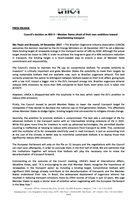PRESS RELEASES
Council’s decision on RED II – Member States afraid of their own ambitions toward decarbonizing transport
 São Paulo and Brussels, 19 December 2017 —The Brazilian Sugarcane Industry Association (UNICA) welcomes the decision reached by the EU Energy Ministers on 18 December 2017 to set a Member State binding target of renewable energy in the transport sector of 14% by 2030. Although the actual target should be closer to 20% in order to achieve the long-term goal of a 60% emissions reduction in transport, the binding target is a much-needed step to ensure a level of Member State commitment and responsibility.
São Paulo and Brussels, 19 December 2017 —The Brazilian Sugarcane Industry Association (UNICA) welcomes the decision reached by the EU Energy Ministers on 18 December 2017 to set a Member State binding target of renewable energy in the transport sector of 14% by 2030. Although the actual target should be closer to 20% in order to achieve the long-term goal of a 60% emissions reduction in transport, the binding target is a much-needed step to ensure a level of Member State commitment and responsibility.
The Council’s choice to maintain the 7% cap on conventional biofuels “to provide certainty to investors” is critically important and gives Member States the possibility to meet their targets by using sustainable biofuels that are available now, such as Brazilian sugarcane ethanol. The text correctly preserves the option to distinguish between biofuels based on their ILUC effect, giving fuels with a low ILUC impact a bigger role in the EU’s transport energy mix. Brazilian sugarcane ethanol reduces GHG emissions by more than 50% compared to fossil fuels, even when ILUC is taken into account.
However, UNICA is disappointed with the loopholes in the text, which lower the EU’s ambition to reduce GHG emissions.
Firstly, the Council moved to permit Member States to lower the overall transport target for renewables if they decide to decrease the national cap on first-generation biofuels. This effectively allows Member States to dodge higher, binding targets that are essential to mitigate climate change.
Secondly, the ambition to promote biofuels is compromised. The text sets a sub-target of 3% for advanced biofuels in the transport sector with an intermediate binding milestone of 1% in 2025. While this gives more time for investors to scale up advanced technologies, the permitted double-counting is ineffective at helping to reduce GHG emissions from transport by 2030. This, combined with the multiplier of 5x for renewable electricity used in road transport, is just an accounting trick at the cost of the climate. A better way to incentivise sustainable biofuels is to deploy those that significantly reduce GHG emissions.
The European Parliament will vote on the file on 15 January and the negotiations with the Council can start soon afterwards, in order to conclude them in the first half of 2018. We are optimistic that the institutions together will ensure that biofuels will play the necessary role to move the decarbonisation of transport forward.
Commenting on the outcome of the Council meeting, UNICA’s Head of International Affairs, Géraldine Kutas, said: “It is encouraging to see that Member States recognise the importance of renewables in the transport sector by including a binding target. Conventional biofuels with significant GHG savings already contribute to the decarbonisation of transports and the Member States understood their role. In Brazil, the widespread deployment of sugarcane ethanol has resulted in reducing transport emissions there by 370m tonnes of CO2eq in just 13 years. We urge Member States to apply a similar level of ambition when negotiating with the European Parliament in the New Year.”
About UNICA
UNICA is the leading trade association for the sugarcane industry in Brazil, representing 60% of the country’s sugarcane production and processing. UNICA’s priorities include serving as a source for credible information and analysis about the efficiency and sustainability of sugarcane products, particularly ethanol and bioelectricity. The association works to encourage the continuous advancement of sustainable practices throughout the sugarcane industry and to promote sugarcane-based biofuels as a clean, reliable alternative to fossil fuels.
Contact: Géraldine Kutas, Head of International Affairs, 0495/120869, geraldine@unica.com.br
MEDIA CONTACTS
In Europe
In North America
In Brazil